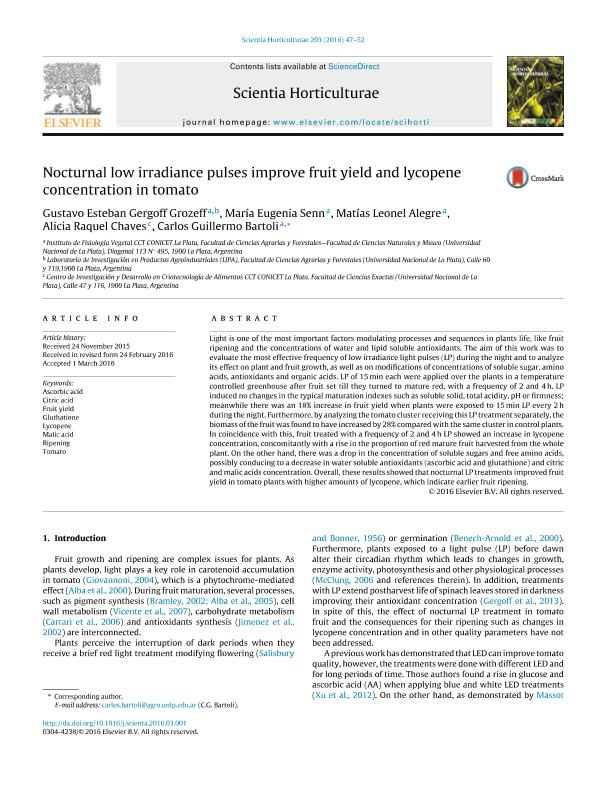Mostrar el registro sencillo del ítem
dc.contributor.author
Gergoff Grozeff, Gustavo Esteban

dc.contributor.author
Senn, María Eugenia

dc.contributor.author
Alegre, Matias Leonel

dc.contributor.author
Chaves, Alicia Raquel

dc.contributor.author
Bartoli, Carlos Guillermo

dc.date.available
2017-11-30T18:33:18Z
dc.date.issued
2016-03
dc.identifier.citation
Gergoff Grozeff, Gustavo Esteban; Senn, María Eugenia; Alegre, Matias Leonel; Chaves, Alicia Raquel; Bartoli, Carlos Guillermo; Nocturnal low irradiance pulses improve fruit yield and lycopene concentration in tomato; Elsevier Science; Scientia Horticulturae; 203; 3-2016; 47-52
dc.identifier.issn
0304-4238
dc.identifier.uri
http://hdl.handle.net/11336/29369
dc.description.abstract
Light is one of the most important factors modulating processes and sequences in plants life, like fruit ripening and the concentrations of water and lipid soluble antioxidants. The aim of this work was to evaluate the most effective frequency of low irradiance light pulses (LP) during the night and to analyze its effect on plant and fruit growth, as well as on modifications of concentrations of soluble sugar, amino acids, antioxidants and organic acids. LP of 15 min each were applied over the plants in a temperature controlled greenhouse after fruit set till they turned to mature red, with a frequency of 2 and 4 h. LP induced no changes in the typical maturation indexes such as soluble solid, total acidity, pH or firmness; meanwhile there was an 18% increase in fruit yield when plants were exposed to 15 min LP every 2 h during the night. Furthermore, by analyzing the tomato cluster receiving this LP treatment separately, the biomass of the fruit was found to have increased by 28% compared with the same cluster in control plants. In coincidence with this, fruit treated with a frequency of 2 and 4 h LP showed an increase in lycopene concentration, concomitantly with a rise in the proportion of red mature fruit harvested from the whole plant. On the other hand, there was a drop in the concentration of soluble sugars and free amino acids, possibly conducing to a decrease in water soluble antioxidants (ascorbic acid and glutathione) and citric and malic acids concentration. Overall, these results showed that nocturnal LP treatments improved fruit yield in tomato plants with higher amounts of lycopene, which indicate earlier fruit ripening.
dc.format
application/pdf
dc.language.iso
eng
dc.publisher
Elsevier Science

dc.rights
info:eu-repo/semantics/openAccess
dc.rights.uri
https://creativecommons.org/licenses/by-nc-nd/2.5/ar/
dc.subject
Ascorbic Acid
dc.subject
Citric Acid
dc.subject
Fruit Yield
dc.subject
Gluthatione
dc.subject
Lycopene
dc.subject
Malic Acid
dc.subject
Ripening
dc.subject
Tomato
dc.subject.classification
Otras Ciencias Biológicas

dc.subject.classification
Ciencias Biológicas

dc.subject.classification
CIENCIAS NATURALES Y EXACTAS

dc.title
Nocturnal low irradiance pulses improve fruit yield and lycopene concentration in tomato
dc.type
info:eu-repo/semantics/article
dc.type
info:ar-repo/semantics/artículo
dc.type
info:eu-repo/semantics/publishedVersion
dc.date.updated
2017-09-19T14:17:34Z
dc.journal.volume
203
dc.journal.pagination
47-52
dc.journal.pais
Países Bajos

dc.journal.ciudad
Amsterdam
dc.description.fil
Fil: Gergoff Grozeff, Gustavo Esteban. Consejo Nacional de Investigaciones Científicas y Técnicas. Centro Científico Tecnológico Conicet - La Plata. Instituto de Fisiología Vegetal. Universidad Nacional de La Plata. Facultad de Ciencias Naturales y Museo. Instituto de Fisiología Vegetal; Argentina
dc.description.fil
Fil: Senn, María Eugenia. Consejo Nacional de Investigaciones Científicas y Técnicas. Centro Científico Tecnológico Conicet - La Plata. Instituto de Fisiología Vegetal. Universidad Nacional de La Plata. Facultad de Ciencias Naturales y Museo. Instituto de Fisiología Vegetal; Argentina
dc.description.fil
Fil: Alegre, Matias Leonel. Consejo Nacional de Investigaciones Científicas y Técnicas. Centro Científico Tecnológico Conicet - La Plata. Instituto de Fisiología Vegetal. Universidad Nacional de La Plata. Facultad de Ciencias Naturales y Museo. Instituto de Fisiología Vegetal; Argentina
dc.description.fil
Fil: Chaves, Alicia Raquel. Provincia de Buenos Aires. Gobernación. Comisión de Investigaciones Científicas. Centro de Investigación y Desarrollo en Criotecnología de Alimentos. Consejo Nacional de Investigaciones Científicas y Técnicas. Centro Científico Tecnológico Conicet - La Plata. Centro de Investigación y Desarrollo en Criotecnología de Alimentos. Universidad Nacional de La Plata. Facultad de Ciencias Exactas. Centro de Investigación y Desarrollo en Criotecnología de Alimentos; Argentina
dc.description.fil
Fil: Bartoli, Carlos Guillermo. Consejo Nacional de Investigaciones Científicas y Técnicas. Centro Científico Tecnológico Conicet - La Plata. Instituto de Fisiología Vegetal. Universidad Nacional de La Plata. Facultad de Ciencias Naturales y Museo. Instituto de Fisiología Vegetal; Argentina
dc.journal.title
Scientia Horticulturae

dc.relation.alternativeid
info:eu-repo/semantics/altIdentifier/doi/http://dx.doi.org/10.1016/j.scienta.2016.03.001
dc.relation.alternativeid
info:eu-repo/semantics/altIdentifier/url/http://www.sciencedirect.com/science/article/pii/S0304423816301078
Archivos asociados
